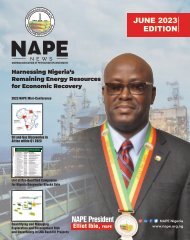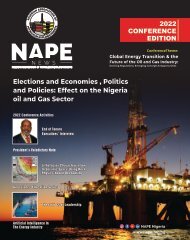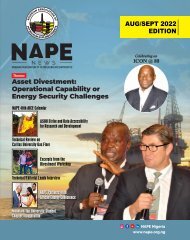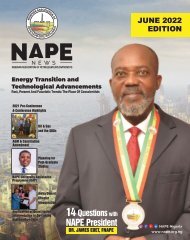NAPENews Magazine August 2021 Edition
NAPE News Magazine August 2021 Edition of the NAPE News is here for your reading pleasure. Happy reading.
NAPE News Magazine August 2021 Edition of the NAPE News is here for your reading pleasure. Happy reading.
You also want an ePaper? Increase the reach of your titles
YUMPU automatically turns print PDFs into web optimized ePapers that Google loves.
COMMUNIQUE
of the WEBINAR of the Nigerian Association of Petroleum Explorationists (NAPE)on
“The Nigerian Oil and Gas Regulations: X-raying the Petroleum Industry Bill (PIB)”
th
held virtually onZOOM platformon Wednesday February 10 , 2021
th
The Nigerian Association of Petroleum Explorationists (NAPE) on Wednesday the 10
nd
of February 2021 held its 2 Webinar Session titled:“The Nigerian Oil and Gas
Regulations: X-raying the Petroleum Industry Bill (PIB)”.
The objective of the Webinarwas to providea synthesized view from the perspectives of
Local independents, International Oil and gas companies and the Legal dimension on
the developing Petroleum Industry Bill with a view to articulating NAPE's position for
the improvement of the bill.
Two industry segments were represented on the panel of discussants, namely, The
Independent Petroleum Producers Group (IPPG) and The Oil Producers Trade Section
(OPTS) of the Lagos Chamber of Commerce and Industry. Additionally, a legal
perspective on the current draft of the PIB was presented on the panel by Advisory
Legal Services (an independent legal consultant).The OPTS perspectivewas built
around “The PIB and the ease of doing business” and was presented by Mr Sanjay
Nararimhalu, Director Downstream Gas, Chevron Mid-Africa.Mr Ademola Adeyemi-
Bero, MD/CEO of First E&P presented IPPG's “The Nigerian Oil & Gas Regulations: X-
Raying the Petroleum Industry Bill (PIB)”. And the legal perspective by Advisory Legal
Consultants' Adegbite Adeniji was built around “Petroleum Sector Governance – PIB
2020”.
Arising from the various presentations and discussions that followed, NAPE concludes
that although the current draft of the PIB presents several strengths for which the
government should be commended, overall, the bill neither improves Nigeria's Global
competitiveness nor improves investor confidence. Therefore, NAPE,in recognition of
the need to align the bill with Nigeria's aspirations to create a globally competitive
energy sector capable of balancing government returns and investor confidenceas well
as promote the growth and development of indigenous players, suggests the
improvements below.
1. To achieve an investor-friendly industry with local and global
competitiveness for capital to:
a) Grow crude oil and gas reserves to 40 billion barrels and 110 TCF
of(appraised and developed gas), respectively.
b) Grow crude oil and gas production to 3 million barrels per day and 10 B C F/ d ay
gas production daily, and eliminate routine gas flaring,
c) Develop infrastructure for gas-based industrialisation and electrical power
generation, and
d) Increase LNG capacity to 40 MPTA in order to hold market share in global
gas,
Governmenttake at 55-65% does not support capital attraction. Government would
need to increase the allowable operating cost (T1) and Capital cost (T2) recovery to be
greater than 70% as is typical in several new PSCs in Africa.Government should also
increase the annual deductible capital allowance from 10% to 20% in order to give
lenders more comfort to support E&P companies through Reserve-Based-Lending and
project financing.
New Deep Water(DW) oil projects should be granted an escalating royalty regime
based on cumulative production from first production or a 5-yr royalty holiday with
Hydrocarbon Tax removed.New DW non-associated gas projects require lower royalty
rates to unlock.
Government should allow for the preservation of existing projects and earned rights by
retaining rights to contractual dispute resolution – including not forfeiting claims on
existing disputes, stabilisation of historical legislative and regulatory changes which
impacted past investment returns, sustain PSC/PSA tax benefits earned but not utilised
by conversion date (such as ITCs and ITAs) on conversion, retention of earned
allowances in upstream for AGFA based investments and the right to subsurface
resources.
2. The legal drafting aspects need to:
a) Clarify and remove uncertainties on the industry structural and legal
framework. The governing board of the Petroleum Regulatory Commission
should accommodate all6 executive commissioners (rather than only 4) in
support of the concept of collective responsibility and equality of
commissioners for the works of the commission as well as provide for
staggered appointments.
b) Synergise thecontributions of and interfaces between the ministries of
petroleum, power and environment.
c) Simplify the tax system and administration to ensure clarity,
includingdispute resolution mechanisms.
d) Preserve base businesses and rights by providingclear assurances to
investors with regards to the sanctity of existing contracts at conversion
often hinged on long term investments requiring contract sanctity to boost
investor confidence.
e) Clear delineation of roles amongst industry players and the removal of
multiple regulations with underlying bureaucratic challenges and resultant
approval delays.
3. Reduce the high cost of doing business by:
a) Entrenching best practice in lease renewal and bid rounds. Provide for the
commission to create the framework, benchmarks and boundaries and
exceptions for all FDPs for automatic award of a PML when FDPs have been
approved. Provide clarity on maintenance of Marginal Field Fiscal and nonrequirement
to pay gas or price-based royalties.
b) Holistically addressing the above ground risksusingpolicy and legislation
toimprove security and reduce community agitation, bureaucracy and
ineffective governance.Provide for host community payments to be 1.5% of
profits from preceding year.
c) Introducing legislation to drive down high cost premium. Reduce the
plethora of taxes, fees, and levies which currently amounts to about 10%
increase in costs given that Nigerian costs at are higher than the global
average by over 69% for projectsand 42% for operations.
d) Amend the clauses abandonment and environmental remediation to
introduce flexibility to accommodate different funding options apart from
only escrow account to meet objective.
4. Improve the midstream and downstream regulatory environment by:
a) Full deregulation of the downstream sector and radical increase of
domestic refining capacity to reduce dependence on petroleum products
importation.
b) Enabling profit-reflective tariff on a willing seller/willing buyer basis.
c) The sustainable injection of liquidity through the prompt payment for gas
consumed and the payment of arrears.
d) Enabling investments in gas with focus on the multiplier effects on the
economy rather than on gas sales proceeds.
e) Given that the products sector has been or needs to be deregulated, gas
needs to move towards commercially driven pricing. Amend to allow willing
buyer willing seller basis.The PIB should include a clear path towards
transitioning to a free market-based pricing.
5. Post PIB implementation of the new framework to address:
a) The reduction of contracting cycles and the high structural cost in upstream
projects execution.
b) Inclusion ofprovisions which require the commission (and the authority) to
consult with the public prior to drafting regulations.
Mrs. Patricia Ochogbu, FNAPE
President (2020 - 2021)
Dr. James Edet, FNAPE
President - Elect (2020 - 2021)
This Commique was submitted to the National Assembly as NAPE’s Position ahead of the Passage of the PIB.










